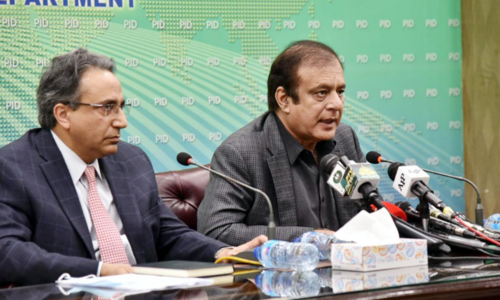ISLAMABAD: A hurriedly-called meeting of the Economic Coordination Committee (ECC) on Thursday decided to provide an unspecified amount of subsidy arising out of abolition of peak electricity rates for industrial consumers already approved by the federal cabinet and the National Electric Power Regulatory Authority (Nepra).
The single point meeting called on the request of the Power Division surprised ECC members including the chairman Dr Abdul Hafeez Shaikh.
The members noted that a summary moved by the Power Division on abolishment of time-of-use (TOU) tariff for industrial consumers throughout the country — including Karachi — had been approved by the ECC, Cabinet Committee on Energy (CCoE) and the federal cabinet in the first week of November which had been subsequently cleared by Nepra for notification.
Therefore, they believed there was no point in calling an emergency ECC meeting after completion of all formalities. The Power Division told the ECC that Nepra had pointed out that while the industrial support package had been cleared along with allocation of about Rs21 billion subsidy, the discontinuation of ToU scheme would also generate some subsidy or add to the circular debt and had not been accounted for.
Under the ToU scheme, consumers are charged off-peak rate of about Rs15 per unit for about 18 hours while five peak hours in the evening are subjected to about Rs21 per unit. The abolition of peak rate meant the industry would enjoy flat rate of about Rs15 per unit involving about Rs6 per unit gap.
Some of the members believed that higher electricity consumption as a result of the overall industrial package and an end to peak charges would itself take care of the revenue difference. The Power Division did not agree and demanded that the ECC should clearly approve Nepra directive that “difference in this regard would be picked up by the GOP as subsidy”.
The ECC members then wanted to know the amount of such a subsidy which was not available because the estimates for such higher consumption were also not clear. The ECC members noted that the Power Division had apparently brought the matter too early to the forum and should have waited for at least a month to have some actual numbers for subsidy or build up to circular debt.
However, the ECC finally approved in principle the proposal regarding amendments in the respective tariff SROs (statutory regulatory order or gazette notification) both for the distribution companies (Discos) of ex-Wapda and K-Electric “to charge the off-peak rates against the peak hours.
“The abolishment of peak and off-peak tariff structure would be implemented with effect from Nov 1 2020 till April 30 2021,” an official announcement said.
Nepra has already approved the industrial package as it did not have impact on its determined tariff as “the federal government intends to further reduce the peak rate for industrial consumer through provision of additional subsidy”. As such “during peak hours the off-peak rate (Rs12.96 per unit) along with applicable quarterly adjustments would be charged with effect from Nov 1, 2020 till April 30, 2021 and the difference in this regard would be picked up by the government as subsidy”, Nepra ordered. This is applicable to all industrial consumer categories irrespective of Discos and KE.
On the other hand, the regulator said the rate of Rs12.96 per unit will be charged from B1, B2, B3 and B4 industrial consumers of Discos from Nov 1, 2020 to Oct 31, 2023 for incremental consumption in off-peak hours over the corresponding period (March 2019 to February 2020 to exclude Covid-19 months impact). There is no subsidy involved in this case.
On top of this, the government would further reduce the rate to Rs8 per unit (a discount of Rs4.96 per unit) on incremental consumption basis for off-peak hours for B1, B2, B3 industrial consumers from Nov 1, 2020 to June 30, 2021 (eight months). In that case, the government would provide Rs14bn subsidy (out of Covid-19 stimulus package) to ensure Rs8 per unit rate for eight months.
No quarterly adjustment would be passed to B1, B2, B3 and B4 industrial consumers to the extent of incremental sales till the continuation of this package. However, the increase in monthly fuel cost adjustments (FCA) would be applicable to B1, B2 and B3 consumers but they would not benefit from reduction in FCA during the applicability period of Rs8 per unit.
B4 consumers paying Rs12.96 per unit for incremental sales would be allowed the impact of positive impact of monthly FCA.
Due to difference in industrial slabs as per multi-year tariff of Oct 9, 2017, risk of sales whether positive or negative lied with KE. Therefore, the discount of Rs4.96 per unit consumers in B1, B2 and B3 from the base rate and difference regarding rate of Rs12.96 per unit for B4 and B5 industrial consumers for incremental sales would be picked up by the federal government as about Rs7bn subsidy.
Positive monthly FCA would be applicable to B1, B2, B3, B4 and B5 industrial consumers on the incremental sales till continuation of the package, however, negative FCA will not be allowed. The amount so retained by K-Electric would be adjusted in subsequent quarterly adjustments.
Published in Dawn, December 4th, 2020















































